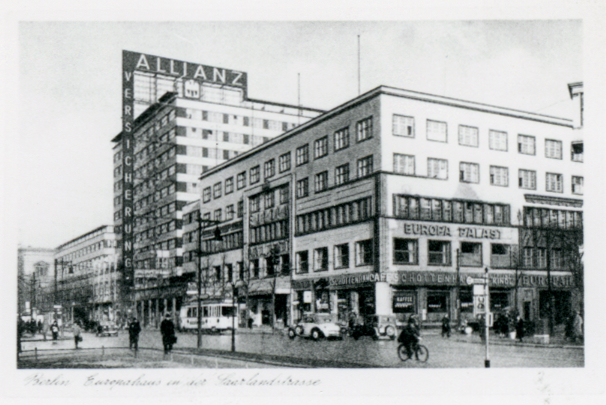After the National Socialists came to power in Germany in 1933, more and more Jewish customers canceled their life insurance policies. The cancellations reached a peak in 1938 after the Nazi government drastically stepped up its anti-Semitic actions. Revenues from life insurance policies had to be paid into a blocked account, which the state used to collect tax demands, debts and other special fees (e.g. the so-called Reich Flight Tax) imposed on the Jewish population. The state also confiscated some life insurance policies of Jewish customers directly.
-
Why were some life insurance policies taken out by Jewish customers not settled?
-
Who profited from it?
-
How were the victims financially compensated?
-
What role does Allianz play in the indemnification process?
-
How many unsettled life insurance policies were found? How were these claims compensated?
-
How will Allianz deal with future enquiries?
-
Who can people contact if they have any questions?
Why were some life insurance policies taken out by Jewish customers not settled?
Who profited from it?
After Jewish customers were forced to leave the country or were deported to concentration camps, the National Socialist government confiscated the money locked in the blocked accounts as well as all possessions of Jewish victims and had their assets seized by the Reich's revenue offices.
How were the victims financially compensated?
As early as 1947, the military governments passed laws for the restitution of assets seized from victims of National Socialist persecution. Since 1953, the newly founded Federal Republic of Germany has passed a number of compensation and restitution laws, most notably the Federal Compensation Law and the Federal Restitution Law.
By 1970 more than four million people had filed applications for compensation under the Federal Compensation Law. Payments were made in 2.7 million cases. (Before the rise of the National Socialist dictatorship, about half a million Jewish citizens lived in Germany.)
In addition, Germany and Israel signed the Luxembourg Agreement in 1952, under which the Federal Republic of Germany would pay restitution amounting to three billion German marks and assist the integration of persecuted Jews in Israel. The agreement also called for payments to be made to the Conference on Jewish Material Claims against Germany (Claims Conference) for unsettled and heirless policies.
Since the 1950s, approximately 78 billion euros (several times more at today's prices) has been paid out in this procedure to provide material compensation for the victims of National Socialist persecution. Payments are still ongoing.
The German Industry Foundation Initiative was set up in 1999 in response to a series of law suits in the USA. Together with the German government, hundreds of German companies (including companies that were not established until after the war) provided ten billion German marks (approximately 5.1 billion euros) for the compensation of former forced laborers, but also for the loss of property. Included was compensation for unpaid or confiscated and not otherwise compensated insurance policies. The funds provided by Germany and the German Industry Foundation Initiative were paid into the newly created Foundation "Remembrance, Responsibility and Future" (Foundation). The Foundation made financial compensation available through partner organizations to former forced laborers and to those affected by other injustices from the National Socialist period.
By 1970 more than four million people had filed applications for compensation under the Federal Compensation Law. Payments were made in 2.7 million cases. (Before the rise of the National Socialist dictatorship, about half a million Jewish citizens lived in Germany.)
In addition, Germany and Israel signed the Luxembourg Agreement in 1952, under which the Federal Republic of Germany would pay restitution amounting to three billion German marks and assist the integration of persecuted Jews in Israel. The agreement also called for payments to be made to the Conference on Jewish Material Claims against Germany (Claims Conference) for unsettled and heirless policies.
Since the 1950s, approximately 78 billion euros (several times more at today's prices) has been paid out in this procedure to provide material compensation for the victims of National Socialist persecution. Payments are still ongoing.
The German Industry Foundation Initiative was set up in 1999 in response to a series of law suits in the USA. Together with the German government, hundreds of German companies (including companies that were not established until after the war) provided ten billion German marks (approximately 5.1 billion euros) for the compensation of former forced laborers, but also for the loss of property. Included was compensation for unpaid or confiscated and not otherwise compensated insurance policies. The funds provided by Germany and the German Industry Foundation Initiative were paid into the newly created Foundation "Remembrance, Responsibility and Future" (Foundation). The Foundation made financial compensation available through partner organizations to former forced laborers and to those affected by other injustices from the National Socialist period.
What role does Allianz play in the indemnification process?
In 1997 Allianz, together with 15 other European insurance companies, was sued of not having settled the life insurance policies of victims of Nazi persecution. The company then set up an international telephone hotline to ensure simple and quick access for those making enquiries. Additionally, the company asked an auditing company to search through its archives for policies from the Nazi era.
1998 saw the creation of the International Commission on Holocaust Era Insurance Claims (ICHEIC). Members were the state of Israel, Jewish representatives, US insurance regulators, Allianz, and four other insurance companies. Several months later, Allianz became one of the founding members of the German Industry Foundation Initiative. The work of ICHEIC and the Foundation were linked in order to ensure payment of all unpaid or confiscated and not otherwise compensated insurance policies, irrespective of whether they were issued by Allianz or by another German insurer.
1998 saw the creation of the International Commission on Holocaust Era Insurance Claims (ICHEIC). Members were the state of Israel, Jewish representatives, US insurance regulators, Allianz, and four other insurance companies. Several months later, Allianz became one of the founding members of the German Industry Foundation Initiative. The work of ICHEIC and the Foundation were linked in order to ensure payment of all unpaid or confiscated and not otherwise compensated insurance policies, irrespective of whether they were issued by Allianz or by another German insurer.
How many unsettled life insurance policies were found? How were these claims compensated?
Searches of Allianz's archives by the auditors showed that in the vast majority of cases the proceeds were paid into the policyholders' accounts. Where this was not the case or where the money was confiscated directly by the Nazi regime, the policyholders or their families received compensation under the Federal Compensation Law. In cases where no individual claims were made (known as heirless assets), a lump-sum payment was made to the Claims Conference under the terms of the Luxembourg Agreement. According to German law, the Claims Conference acted as the legal successor for heirless Jewish assets.
Nevertheless, Allianz was interested in clarifying all possible cases and to compensate all customers or their families who have only discovered evidence of life insurance policies in recent years.
In 2002 ICHEIC, the Foundation and the German Insurance Industry Association (GDV) signed an agreement governing the settlement of individual claims on unpaid or confiscated and not otherwise compensated insurance policies of German insurance companies in connection with National Socialist injustice. ICHEIC received a total of over 280 million euros from the Foundation. Under this agreement, the German insurance companies received more than 19,400 enquiries involving a search for more than 86,000 names. In nearly 3,200 cases (with nearly 16,000 names), a company was specifically named. In more than 16,200 cases (with nearly 70,400 names) no company was specifically mentioned; i.e. all German insurance companies searched through their archives, as far as available, for these cases.
In total 11,399 policies could be settled, 3,861 of which related to blocked account cases where the insurance proceeds were paid before 1945 into an account blocked by the state. The average compensation amount was nearly 9,000 US dollars.
Altogether, more than 48,000 insurance claims with a total value of more than 300 million US dollars were compensated through ICHEIC. In addition, more than 170 million US dollars was made available for humanitarian purposes.
Nevertheless, Allianz was interested in clarifying all possible cases and to compensate all customers or their families who have only discovered evidence of life insurance policies in recent years.
In 2002 ICHEIC, the Foundation and the German Insurance Industry Association (GDV) signed an agreement governing the settlement of individual claims on unpaid or confiscated and not otherwise compensated insurance policies of German insurance companies in connection with National Socialist injustice. ICHEIC received a total of over 280 million euros from the Foundation. Under this agreement, the German insurance companies received more than 19,400 enquiries involving a search for more than 86,000 names. In nearly 3,200 cases (with nearly 16,000 names), a company was specifically named. In more than 16,200 cases (with nearly 70,400 names) no company was specifically mentioned; i.e. all German insurance companies searched through their archives, as far as available, for these cases.
In total 11,399 policies could be settled, 3,861 of which related to blocked account cases where the insurance proceeds were paid before 1945 into an account blocked by the state. The average compensation amount was nearly 9,000 US dollars.
Altogether, more than 48,000 insurance claims with a total value of more than 300 million US dollars were compensated through ICHEIC. In addition, more than 170 million US dollars was made available for humanitarian purposes.
How will Allianz deal with future enquiries?
Allianz will continue to ensure that all its life insurance policies that remained unpaid and were not compensated will be settled.
Who can people contact if they have any questions?
Contact Anja Rechenberg
Tel. +49.89.3800-4511
Tel. +49.89.3800-4511

